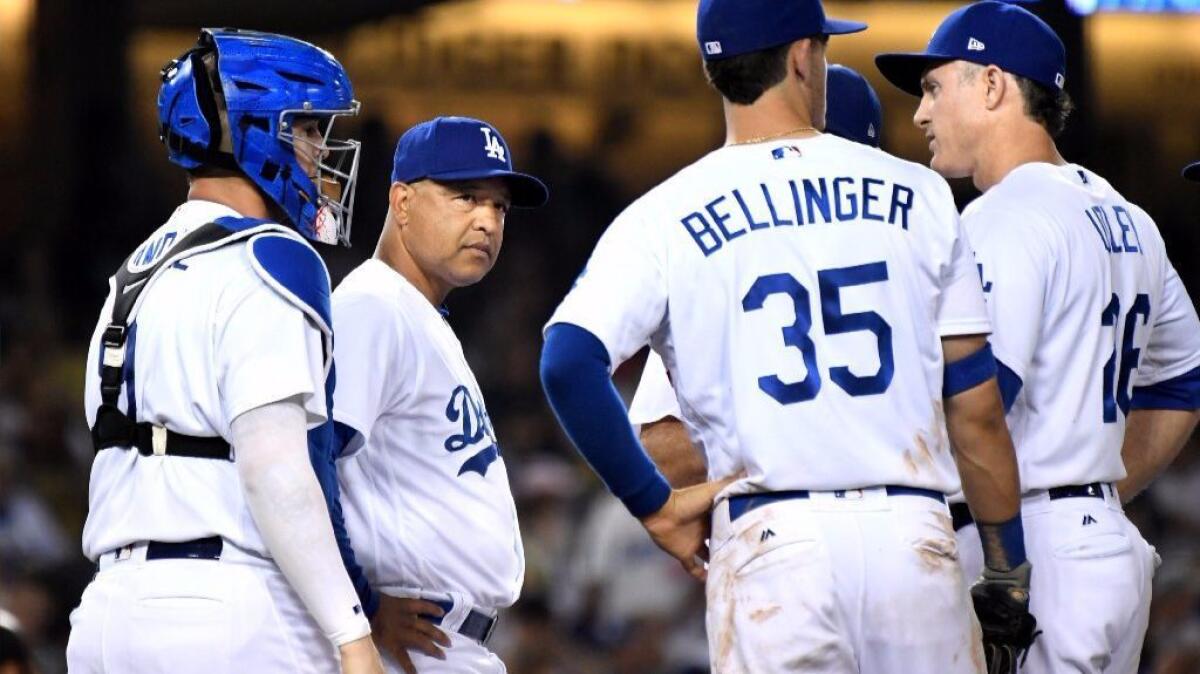Dodgers manager Dave Roberts will play the hero or the villain depending on how the playoffs go
- Share via
One day in September, amid one of the worst stretches of baseball in Dodgers history, manager Dave Roberts strolled into the dugout at Dodger Stadium for his pregame news conference.
Standing nearby was first baseman Adrian Gonzalez, an injured veteran pretending to be a reporter. Roberts smiled as Gonzalez pitched a question.
“Are you the best manager in the world?” Gonzalez said. “Or the worst manager in the world?”
Roberts heard only the first part. His answer explained how fast the pendulum of public opinion can swing.
“I was about 10 days ago!” Roberts cracked.
The joke by Gonzalez represents a microcosm of the challenges that face Roberts and the Dodgers as they open the playoffs on Friday at Dodger Stadium.
A championship would justify the summer-long hype that trailed the team, exemplified by an already infamous Sports Illustrated cover-line: “Best. Team. Ever?”
An early exit would dredge up region-wide pessimism about the organization, which has fallen short of reaching the World Series in every season since 1988.
These are the stakes. All or nothing. One of the most memorable teams in franchise history or one of the most disappointing.
Roberts, the 45-year-old reigning National League manager of the year, bears the burden of this responsibility. He rode the wave with the rest of his club as they ran away with the National League West, playing the best 50-game stretch of baseball since 1912 and going on a 52-9 streak. He crashed with the group in August and September as the team went 1-16, including an 11-game losing streak, the longest by any Dodgers team since 1944.
It’s always my fault. That’s OK. That’s what I signed up for.
— Dodgers manager Dave Roberts

As the public face of the organization, Roberts understood that he wouldn’t receive all the credit for the winning. But he knew where the blame for the losing would land.
“It’s always my fault,” he said on the final day of the regular season, wearing a grin inside a dugout in Colorado. “That’s OK. That’s what I signed up for.”
Roberts occupies one of the most coveted, and most challenging, positions in baseball. The Dodgers flaunt the game’s highest payroll. They employ superstars such as left-handed ace Clayton Kershaw, closer Kenley Jansen and shortstop Corey Seager while managing the deepest roster in the sport. At the trade deadline this summer, the front office sacrificed prospects to acquire right-handed ace Yu Darvish.
Yet Roberts also must inculcate the players in the novel practices of president of baseball operations Andrew Friedman’s front office. The Dodgers ask their players to sacrifice individual achievements for collective gain — a difficult request in a sport that pays its players based on individual achievements. Roberts and his coaches must translate the analytically driven data provided by Friedman and his lieutenants.
At times in 2017, Roberts resembled a man at the helm of a juggernaut. In September, as the losses piled up, he looked like the captain of a ship waiting to right itself.
Roberts expected scrutiny last season, his first as a manager. Even then he admitted the level of vitriol toward him was “a little surprising” in the final month of this season. A few of his players agreed.
“I don’t worry about the fans,” catcher Yasmani Grandal said. “Nothing against them, but they have no clue what baseball is about. They think that we get here at 6 p.m., we stretch and then we go play. I don’t really worry about what they think.”
He added, “There’s always going to be opinions. But for us, the opinions that matter are coming from within our organization.”
Roberts does not monitor social media, where his in-game decisions undergo a daily dissection from fans and members of the media. He relies on updates from his teenage son, Cole. Roberts is not always eager to hear them. Sometimes Cole can’t stop himself.
What his son tells him is “not good,” Roberts said. “But that’s OK. I can’t imagine what it would be if we won less than 103 games.”
The Dodgers finished the regular season with 104 victories, the most since Walter O’Malley moved the team to Los Angeles in 1958. It is the best record in baseball. The road to the World Series rolls through Dodger Stadium — if the team can get there.
“Everybody, for the most part, is very healthy,” pitcher Rich Hill said. “That goes to show that the front office and the coaching staff took notice of that during the season, to get everybody in the position that we’re in now.”
The path to a championship appeared clear about six weeks ago. On Aug. 25, the Dodgers led the National League West by 21 games. The losing compounded like an avalanche, or, in the words of general manager Farhan Zaidi, “a perfect storm of a lot of things, and a lot of games that we probably should have won that we were a little unlucky with.” By Sept. 11, the lead had dwindled to nine.
Both Zaidi and Friedman praised Roberts for how he handled the pressure. Roberts projected positive energy at a time when pessimism crept close to the door.
“He was the only one who had to talk to the media twice a day, every day,” Friedman said. “It’s only human nature to let some of the negativity seep in and manifest itself in how you communicate with the players and the coaches. And I not only saw none of that, but it was to the contrary. His relentless optimism was even more present and pronounced during that time.”
As the losses mounted, Roberts absorbed criticism for his tactics. He stuck with outfielder Curtis Granderson, who hit .161 after joining the team in mid-August. He maintained confidence in reliever Pedro Baez, famed for his playoff meltdowns, even after Baez posted a 10.38 earned-run average in September.
When the lineup sputtered, Roberts was blamed for juggling its composition too often. When the relievers combusted, Roberts was blamed for choosing the wrong ones. The frustration was not shared by the Dodgers front office, who view Roberts as one of baseball’s best strategists.
“The way he goes through information but still allows himself to adapt to game situations, our confidence couldn’t be higher,” Zaidi said.
Faith in Roberts will be crucial this month, the time of year when a manager’s maneuvers loom largest. He earned raves for the strings he pulled in Game 5 of the National League Division Series last October. He returns to the playoffs on Friday with, despite the tumult and the late-season tumble, a team that won more games than any other in 2017.
“As long as I have the trust of the players, and they know what me and the coaches are trying to do each day, and the goal is to help the Dodgers win, that’s my only goal,” Roberts said. “For the people who can’t see it, or can’t understand the way we do things, that’s OK.”
Follow Andy McCullough on Twitter @McCulloughTimes
More to Read
Are you a true-blue fan?
Get our Dodgers Dugout newsletter for insights, news and much more.
You may occasionally receive promotional content from the Los Angeles Times.









